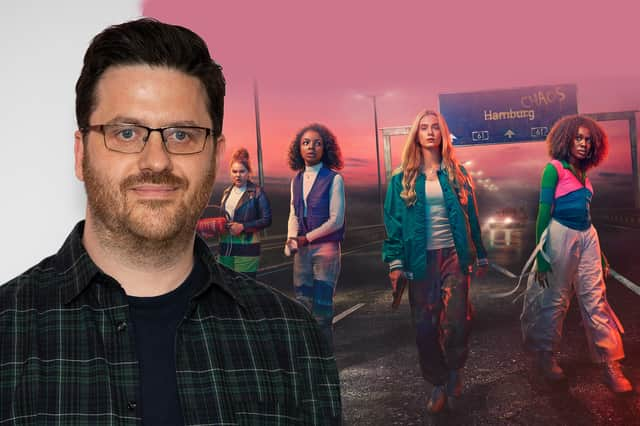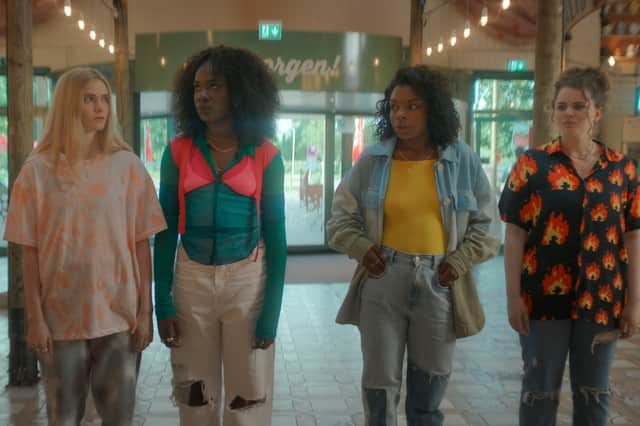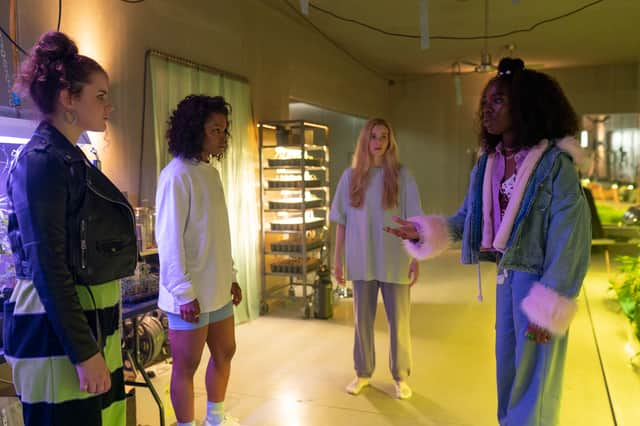Exclusive:Ben Chanan on Then You Run, the challenges of adapting Zoran Drvenkar’s novel, The Capture Season 3, and more


“I think heightened is harder than grounded,” says writer Ben Chanan, talking about his new thriller Then You Run, before laughing. “Well, everything's hard, a grounded tone isn't easy either.”
Chanan, best known for creating the BBC One thriller The Capture, recently joined NationalWorld’s Alex Moreland to introduce his new series Then You Run. He explained what first drew him to Zoran Drvenkar’s original novel, detailed some of the changes that needed to be made to adapt the story to screen, and talked about the show’s heightened, Coen brothers-esque tone.
Advertisement
Hide AdAdvertisement
Hide AdHe then went on to talk about some of his broader creative influences, praising both the cast and director Robbie McKillop, and spoke about why Then You Run’s non-linear structure appealed to him creatively. Finally, Chanan teased the possibility of a second series of Then You Run (and also, perhaps, a third series of The Capture?).
So, first of all, just to set the scene a little bit: where did work begin on Then You Run for you? What was it that drew you to the original book, why did you want to adapt it?
Somebody sent me the book in 2016, and said, “Look, how would you feel about adapting this?” I'd never adapted anything before, so I didn’t really know how I felt about it, but as soon as I started reading it, I realised that I felt like it was a challenge that excited me. It was very ambitious, a very ambitious novel, because it's an ensemble. Up until then, most of the stories that I’d written tend to follow one character or two, in a slightly more traditional way, and I loved the challenge of trying to juggle an ensemble. In the book, it's like 30 characters – and we've had to narrow it down, because there's only so many people you can keep track of, I think, when you're watching a series – but I love the challenge of juggling all those different characters, and all those different storylines, across different genres as well.
How did you approach that, as an adaptation? I can’t say I’m massively familiar with the original book myself, but as I understand it this isn’t necessarily a direct 1:1 adaptation – how do you decide what to keep and what to change?
Advertisement
Hide AdAdvertisement
Hide AdClearly, there are changes you have to make. For example, I immediately saw this as a road trip, I thought that this is where the action starts – in the book, the road trip starts halfway through. We clearly had to kick them off and get them running earlier. Then, you know, I couldn't fit every character from the book, and I tried to amalgamate something of the personality of those characters into other characters, or into situations. So it went from there.


One thing I did know about the book is it’s written in the second person – did you give much thought to trying to capture that effect here? Is there a way to translate that to screen?
That was difficult, I think you could drive yourself insane with that [laughs]. I think one of the decisions I made early on was to go, we're not doing that. You know, it's not the same as first person – it’s not like Peep Show, where everything's shot in first person – I don't know what the visual equivalent of it is. Maybe someone far cleverer than me could have worked that out!
What I thought about was, you know, there's that, the book is written in the second person, but there’s also other things that are that are remarkable about the book. Its playfulness with linearity, its ambition in terms of mixing genres – you've got a gangster story, a coming-of-age story, and then this strange mythical serial killer story – and you're waiting in the book for how those three stories are going to intersect. And I think you're waiting in the series as well! When they do intersect, I think they're very satisfying.
Advertisement
Hide AdAdvertisement
Hide AdIn other words, we kept the irreverence of the book, we kept the ambition of it – I hope – we kept the sense of ensemble, and we kept the playfulness in terms of time. So, the attitude is there, but trying to find a visual equivalent of the second person I didn't think was worth sending yourself insane over.
Of course, yeah – I asked mainly because when I read that, it just seemed so difficult to me, I couldn’t get my head around it. I wanted to pick up a bit on what you were saying about the show’s playfulness with time. Shows unfolding across different timelines is such a popular device now – I was at Q&A yesterday and the writer argued that his show was innovative for being linear – so I was wondering how you approach that device, what the challenges are, what the benefits are?
I think – I hope – that we've got the balance right in this show, in that it's not a brain teaser, it's not like it's a really difficult puzzle to work out. I mean, honestly, as an audience member, I like doing a bit of work, and there's nothing wrong with that at all.
So do I!
Certainly, maybe you have to do a bit. But at the same time, this is – I hope – ultimately a lot of fun. I think you don't have to sit there struggling over ‘wait, where are we again’ and all that, because it's not like a tidal wave of narrative with a big whodunit plot. It's not about that at all. The playfulness with linearity is done more for characterizations: little character reveals to help you understand what the characters understand in the present. I think it helps sometimes, to go back and forward in time, but it's not too taxing, I don't think.
Advertisement
Hide AdAdvertisement
Hide AdThe end of episode two I thought was particularly neatly done. Tonally – because this is such a heightened show – did it feel like much of a departure from your previous work? Things like The Capture, but also Cyberbully and Blackout, all a bit more… grounded, would you agree?
For sure it felt like a departure, because it is much more heightened than anything I've done. That's another reason that drew me to the project, really, it just felt very different, and certainly very enjoyable. Getting that tone right? I think heightened is harder than grounded. Well, everything's hard, a grounded tone isn't easy either. But knowing how heightened to push it, hopefully without it getting broad – or too broad – that's the key. Direction is key to that, and Robbie McKillop, our first director, set that tone beautifully in the first block, and the other directors developed it beautifully as it went on. In fact, I'm proud of all of them really, that they kept the tone afloat across three different directors and three different DPs – and obviously the cast are massively, massively important, in that they got the tone of this dialogue just perfectly.
Was there any thought given to the possibility of you directing? Was that on the cards ever?
Oh, no. Well, I was making The Capture, that was happening at the same time I was writing this, so it just wasn't possible. I couldn't direct either of them, I was showrunning both at the same time, which was the challenge. I'd love to have done, but I couldn't. But to be honest, having seen Robbie's work, I was super excited to see what a different director would bring [to the show]. You know, he did a series called Guilt, and that was just the closest thing to the tone the Fargo TV series as I've seen on British TV – to know that Robbie could have that level of control of tone, I knew he could do an amazing job with this.
Advertisement
Hide AdAdvertisement
Hide Ad

Could you tell me a little about the casting, how you found everyone? I was a big fan of Vivian Oparah anyway, that’s why this was on my radar.
Did you see Rye Lane?
Yes! I thought she was fantastic in that.
Yeah, Vivian is just amazing. The casting of the Fab Four was a very extensive process. Robbie and our co-producer Derek [Ritchie] and Daniel Edwards, our casting director, did a brilliant job in chemistry casting those four. They met lots of other brilliant, brilliant actresses, who we were very tempted by, but this felt like the four.
Although it's a heightened tone, I still want it to believe these were four friends from the same neighbourhood, from a very specific part of London, who had all gone to the same school together. You really believe them as friends, you know, and particularly as friends who are just past school and in that awkward phase of ‘are we are we gonna stay together as a friendship group, or not? And what is it that unifies us?’ I felt that they had to get that casting right, and I think they do. I think they've done a great job with the casting.
On a slightly broader note, what would you say are your big creative influences as a storyteller? How do you see them manifest in Then You Run?
Advertisement
Hide AdAdvertisement
Hide AdObviously, we talked about Fargo, and I think that kind of Fargo [is a big one]. I think that Lynch's film Wild at Heart, you know, that anarchic spirit, was kind of in my mind. I think Robbie will have his own influences, you know, in terms of the style of it, but Fargo was a big one. Raising Arizona, too, the classic Coen Brothers – slightly irreverent, an almost slightly absurd touch. And the humour as well, of course.
What have you been watching and enjoying at the moment?
I’m still reeling from Succession! I still think Succession is still the last great thing that I watched. I'm still blown away by the funeral – I think the funeral episode of Succession, the penultimate episode, that’s among the best hour plus of TV ever made. I mean, it was just perfect. So, I'm still reeling from that, I haven’t started anything since then.
No, I totally understand that. Is there anything you can tell us about anything you’re working on at the moment, or what plans you have for what’s next?
I've written a pilot for a series that I hope will get made, provisionally called Ravers with Guns. I'm probably not allowed to talk about it very much, but it is an interesting counterpoint to Then You Run, in that this is about four girls going off on a road trip and the other one's about four boys going off on adventures in Europe. I think it's also quite different, but tonally, it's not a million miles away. But you know, that's in very, very early stages – I probably shouldn't have even mentioned it!
Advertisement
Hide AdAdvertisement
Hide Ad

I have to ask, just because it was one of my favourites of last year: is there anything you can tell us about potentially-vaguely-just-at-the-back-of-your-mind whether there might be a third series of The Capture?
I can't say, I can’t confirm or deny. I can't! I can't. But what I will say is – I think it's only fair to say seeing as you've asked so nicely – every day, there's another headline where I'm just like, ‘actually this is the show’. We all, myself and the other producers, we're still bouncing these articles around to each other.
It gets more and more like the show every day, in terms of how convincingly you can replicate, say, a politician to say the opposite of what they believe. So, I'm sure there's still more to play within that area. But sometimes I feel like we went so far with Season 2 terms of what you can do with that technology, or what potentially you could do with that technology, that I almost feel like I need to wait for the real world to catch up with the show, to give me some inspiration for the next chapter of it.
A lot of those articles must be about the Writers Strike, I assume? I imagine you’d have some thoughts on the… I don’t want to say arguments, because it’s not even really a for and against, but the conversation they’re having around the need to regulate AI before it becomes used in screenwriting.
Advertisement
Hide AdAdvertisement
Hide AdI think that, if I’ve got it right, I think they've got to have a conversation about AI. Of course they do. I mean, we've seen now how quickly AI can replicate writing, I think it's a genuine issue. They're right to be concerned about it, for sure. But we all hope obviously the strike gets resolved soon.
On a similar note: does Then You Run adapt the full book? Are you thinking potentially about a second go around?
We do adapt the full book – that said, we’ve had to take a slightly different narrative route to the book, so it doesn’t end in exactly the same way, for sure. It sometimes takes the scenic route getting there as well. But even though it goes to the end of the book, there’s potential for more, yeah. Whether Zoran is going to write a sequel, or there’s more to mine with those characters…? [We’ll see].
Finally, then, just to wrap everything up: what do you hope people take from Then You Run, in terms of their experience watching it?
Advertisement
Hide AdAdvertisement
Hide AdI hope that we've created something that you haven't seen before; I don't know when I've seen a show that's got a gangster story, a mythical mass murderer story, and a coming-of-age story. I think the idea of intercutting those three stories, and those three connecting in a satisfying way over the course of the series, I think hopefully is something that you won't have seen before.
Then You Run begins on Sky Max on Friday 7 July at 9pm, with new episodes airing weekly. You'll also be able to stream the full series as a boxset immediately. You can read our interview with the cast of Then You Run here, or listen to an audio version of the above interview with Ben Chanan on Screen Babble here.
Don't forget to subscribe to our weekly television newsletter, listen to our Screen Babble podcast, and follow us on twitter @NationalWorldTV. You can also find me @morelandwriter.
Comment Guidelines
National World encourages reader discussion on our stories. User feedback, insights and back-and-forth exchanges add a rich layer of context to reporting. Please review our Community Guidelines before commenting.
